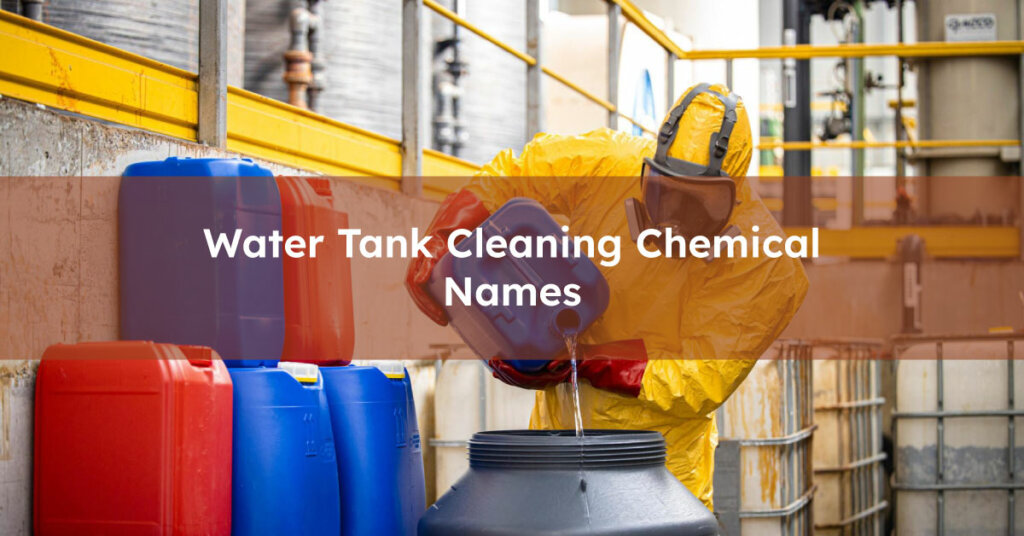Did you know that using the right water tank cleaning chemicals is crucial for maintaining clean and safe water in your tanks? With various options available, finding the best chemical solutions for tank cleaning can seem overwhelming. But don’t worry, we’re here to help you navigate the world of water tank sanitation products.

If you read our guide to water tank cleaning in Dubai you know that using the right chemicals is essential to ensure effective sanitization. Whether you’re looking for a water tank cleaner, a water tank disinfectant, or eco-friendly tank cleaning solutions, we’ve got you covered.
Table of Contents
Key Takeaways
- Choosing the right water tank cleaning chemicals is crucial for ensuring safe and clean water.
- Chlorine-based disinfectants like sodium hypochlorite and calcium hypochlorite are commonly used for tank cleaning.
- Oxygen-based disinfectants like hydrogen peroxide and potassium permanganate offer eco-friendly alternatives.
- Algaecides are effective in controlling and preventing the growth of algae in water tanks.
Chlorine-Based Disinfectants
When it comes to effectively sanitizing your water tank, chlorine-based disinfectants prove to be a popular choice. These powerful cleaning agents, such as sodium hypochlorite (bleach) and calcium hypochlorite, are highly effective in eradicating harmful bacteria, viruses, and other microorganisms that may be present in your water supply.
| Disinfectant | Key Features |
|---|---|
| Sodium Hypochlorite | Powerful disinfectant that kills bacteria, viruses, and fungi |
| Calcium Hypochlorite | Strong disinfectant for water, effective against a wide range of microorganisms |
Sodium Hypochlorite (Bleach)
Sodium hypochlorite, commonly known as bleach, is a widely used chlorine-based disinfectant. With its strong oxidizing properties, bleach is capable of effectively eliminating a wide range of microorganisms, making it an ideal choice for water tank cleaning in Dubai. Available in liquid form, it can be easily diluted in water to create a powerful disinfecting solution.
Calcium Hypochlorite
Typically available in solid tablet or granule form, calcium hypochlorite can be dissolved in water to create a highly effective disinfecting solution. Its potent disinfecting properties enable it to effectively control and prevent the growth of bacteria and algae in water tanks.
Oxygen-Based Disinfectants
When it comes to water tank cleaning, oxygen-based disinfectants are a safe and environmentally friendly option. These disinfectants are effective in killing bacteria, viruses, and other pathogens, ensuring thorough sanitation for your water tank.
| Disinfectant | Key Features |
|---|---|
| Hydrogen Peroxide | Effective in killing bacteria, viruses, and pathogens |
| Potassium Permanganate | Removes odors and controls microbial growth |
Hydrogen Peroxide
One of the popular oxygen-based disinfectants is hydrogen peroxide. It is known for its potent antimicrobial properties and is extensively used for water tank cleaning. Hydrogen peroxide effectively eliminates harmful bacteria, viruses, and other pathogens, making it a reliable choice for tank disinfection.
Potassium Permanganate
Potassium permanganate is another oxygen-based disinfectant widely utilized in water tank disinfection. This compound not only kills microorganisms but also helps in removing odors and controlling microbial growth. Potassium permanganate is particularly effective in maintaining clean and fresh water in your tank.
By choosing oxygen-based disinfectants like hydrogen peroxide and potassium permanganate, you can ensure the safety and cleanliness of your water tank. These eco-friendly options offer a reliable solution for effective water tank cleaning and disinfection.
Algaecides for Algae Control
Algae growth in water tanks can lead to foul odors and affect water quality. To prevent and control the growth of algae in your water tanks, it is essential to use algaecides, which are chemical solutions specifically formulated for this purpose.
There are several common algaecides that can effectively control algae growth in water tanks:
- Copper sulfate: A commonly used algaecide that helps eliminate and prevent algae growth.
- Sodium carbonate peroxyhydrate: This algaecide releases hydrogen peroxide, which is effective in controlling algae and promoting clean water.
- Quaternary ammonium compounds: These compounds have strong algaecidal properties and can help keep your water tanks free from algae.
Regular use of algaecides is essential to maintain clean and algae-free water tanks. By incorporating these chemical solutions in your tank maintenance routine, you can ensure optimal water quality and minimize the risk of odor and contamination.
Conclusion
In conclusion, choosing the right water tank cleaning chemicals is essential for ensuring safe and clean water. When it comes to tank cleaning chemicals, chlorine-based disinfectants like sodium hypochlorite (bleach) and calcium hypochlorite are commonly used for their effectiveness in killing bacteria, viruses, and other microorganisms in water tanks. These chemicals, available in various forms such as tablets or granules, are known for their powerful disinfectant properties.
However, if you prefer more eco-friendly options, oxygen-based disinfectants like hydrogen peroxide and potassium permanganate can be utilized. These disinfectants are safe and environmentally friendly, offering effective control over bacteria, viruses, and other pathogens in your water tank.
To prevent and control algae growth in your water tank, using algaecides specifically formulated for algae control is recommended. Algaecides like copper sulfate, sodium carbonate peroxyhydrate, and quaternary ammonium compounds can help maintain clean and algae-free water tanks, ensuring optimal water quality for your household or commercial needs.
FAQ
How do I choose the right chemical for cleaning my water tank?
Choosing the right chemical for cleaning your water tank depends on several factors, including the tank’s material, the extent of contamination, and personal safety or environmental concerns. For general disinfection, chlorine-based cleaners like sodium hypochlorite are widely recommended. For eco-friendly options or specific cleaning needs (like removing mineral buildup), hydrogen peroxide or vinegar might be preferred. Always consider the manufacturer’s guidelines and safety recommendations when selecting a cleaning agent.
What chemicals are commonly used for cleaning water tanks?
For cleaning water tanks, common chemicals include chlorine-based disinfectants like sodium hypochlorite (liquid bleach) and calcium hypochlorite (granular or tablet form), which are effective in killing bacteria and viruses. Additionally, hydrogen peroxide is another safe option used for disinfecting water tanks, as it breaks down into water and oxygen, leaving no harmful residues.
Can vinegar be used as a cleaning agent for water tanks?
Yes, vinegar, specifically white vinegar, can be used as a natural cleaning agent for water tanks. Its acidic properties make it effective in killing mild bacteria and removing mineral deposits. However, it may not be as effective against more robust bacteria and viruses as chemical disinfectants. Vinegar is a good option for those seeking eco-friendly cleaning solutions.
Is it safe to use bleach for water tank cleaning?
Using bleach (sodium hypochlorite) for water tank cleaning is safe when diluted properly. It’s a powerful disinfectant that can effectively kill bacteria, viruses, and other pathogens when used in the correct concentration. It’s crucial to ensure the tank is thoroughly rinsed with clean water after disinfection to remove any residual bleach before refilling the tank for use.
Are there any eco-friendly chemicals for water tank cleaning?
Eco-friendly chemicals for water tank cleaning include hydrogen peroxide and citric acid. Hydrogen peroxide is effective in killing bacteria and leaves no toxic residues, decomposing into water and oxygen. Citric acid, found in citrus fruits, can remove stains and sediments without harming the environment. These options are safer for households looking for green cleaning solutions.




